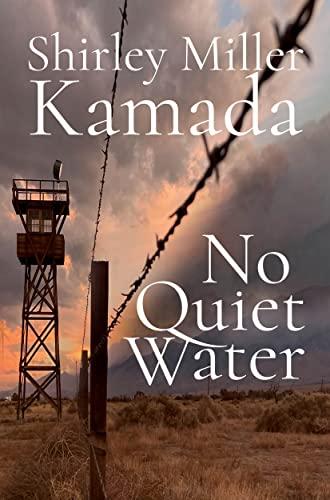I had mixed feelings about this book, which I received as an advance review copy. Kamada’s novel provides a close look at what life was like for a family in the Japanese internment camps. I wish there were more stories about this, so we could have a better understanding of the terrible things that happened to these families. I liked the very personal nature of this story, which is told from the perspective of a young boy in the Manzanar and Minidoka camps. The author explains that her husband was actually born in a camp but it was many years before he talked with his family about their experience.

However, I struggled with the writing style of this novel, which seemed to be aimed at younger readers and which seemed to frequently downplay the serious nature of what occurred. The book is written in a matter of fact tone that was surprisingly unemotional (until near the end). Fumio, who is about 10 or 11, loses his friends, his beloved dog, and his home, but also has many positive experiences, like learning about Japanese drumming, rock gardening, and mechanics and construction work with his father. While I appreciated his resilience and strong character, I thought the author primarily told us about the poor conditions in the camp (which the residents themselves were largely responsible for addressing) rather than letting us experience it. Kamada could have done a better job showing us the deprivations and the huge impacts on families, both financially and emotionally. Fumio seems largely unaware of what his parents are experiencing. I can appreciate that Fumio, as a child, would have adapted quickly to his new surroundings and made the best of it, maybe being unaware of the stresses on his and the other families. But I think his experience could have been written in a way that reflected these stresses, or maybe having both an adult and child narrator would have been more insightful.
Also, while the camps were in operation for 3-4 years, this story is told over a fairly short period of time and the author did not include anything about the aftermath, when many families lost their homes without any compensation and were even pressured to move to Japan, a country they never lived in. I recommend George Takei’s graphic novel about his experience in the camps, They Called Us Enemy, for a more comprehensive view.
I did appreciate the parts of the story that were set on Bainbridge Island. We see a great contrast between the strawberry farm on the lush climate of the island, and the dry, dusty setting of the two camps. Additionally, we see how fortunate Fumio’s family is in having close friends to look after their property. Kamada suggests (but doesn’t explore directly) that it would have been very difficult, even for friends with the best intentions, to maintain a farm they don’t own for several years. Eventually, the government would have come to take the farm, or it would have fallen into blight and disrepair.
A large portion of the book is told from the perspective of Fumio’s dog. While some parts of this story were quite moving, much of it was too cute for me and didn’t add to the story. I think Kamada could have just as easily expressed through Fumio’s eyes how much he missed his pet, rather than sharing the dog’s perspective.
Kamada tells a moving story about a family’s experience in the camps but keeps the tone of the book fairly positive, which will appeal to some readers but felt a little “light” for me. For example, she focuses on Fumio’s personal growth and his development of positive relationships in the camp, with only limited mention of physical deprivations, loss of schooling, and other negative impacts of incarceration. I very much appreciated the historical detail of this book, particularly with regards to Japanese culture, and it’s worth a read for its important subject matter. But I think the author could have been more clear about whether this is a book aimed at younger readers or adults — it is quite long and complex for younger readers, but often too simplistically written for adults.
Note: I received an advance review copy of this novel from NetGalley and publisher Black Rose Writing. This book was published January 5, 2023.

